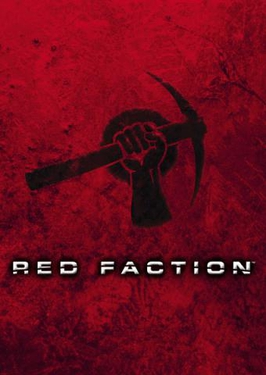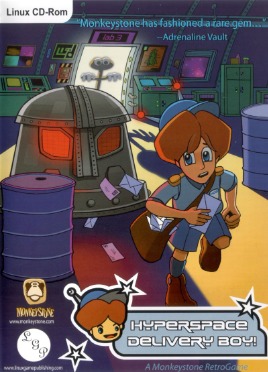
Deus Ex is a 2000 immersive sim developed by Ion Storm and published by Eidos Interactive. Set in a cyberpunk-themed dystopian world in the year 2052, the game follows JC Denton, an agent of the fictional agency United Nations Anti-Terrorist Coalition (UNATCO), who is given superhuman abilities by nanotechnology, as he sets out to combat hostile forces in a world ravaged by inequality and a deadly plague. His missions entangle him in a conspiracy that brings him into conflict with the Triads, Majestic 12, and the Illuminati.

id Software LLC is an American video game developer based in Richardson, Texas. It was founded on February 1, 1991, by four members of the computer company Softdisk: programmers John Carmack and John Romero, game designer Tom Hall, and artist Adrian Carmack.

Red Faction is a first-person shooter video game developed by Volition and published by THQ for PlayStation 2 and Microsoft Windows in 2001, and Macintosh platforms in 2001 and 2002. A version for the N-Gage was developed by Monkeystone Games, and the mobile version was developed by Blue Beck. The game was inspired by several works of contemporary science fiction.

Stevana "Stevie" Case is an American businesswoman. She is known for competing in the first-person shooter game Quake in the late 1990s, as well as contributing professionally to the video game industry.
Commander Keen is a series of side-scrolling platform video games developed primarily by id Software. The series consists of six main episodes, a "lost" episode, and a final game; all but the final game were released for MS-DOS in 1990 and 1991, while the 2001 Commander Keen was released for the Game Boy Color. The series follows the eponymous Commander Keen, the secret identity of the eight-year-old genius Billy Blaze, as he defends the Earth and the galaxy from alien threats with his homemade spaceship, rayguns, and pogo stick. The first three episodes were developed by Ideas from the Deep, the precursor to id, and published by Apogee Software as the shareware title Commander Keen in Invasion of the Vorticons; the "lost" episode 3.5 Commander Keen in Keen Dreams was developed by id and published as a retail title by Softdisk; episodes four and five were released by Apogee as the shareware Commander Keen in Goodbye, Galaxy; and the simultaneously developed episode six was published in retail by FormGen as Commander Keen in Aliens Ate My Babysitter. Ten years later, an homage and sequel to the series was developed by David A. Palmer Productions and published by Activision as Commander Keen. Another game was announced in 2019 as under development by ZeniMax Online Studios, but was not released.

Daikatana is a first-person shooter game developed by Ion Storm. It was published by Eidos Interactive for Windows and Kemco for Nintendo 64. Players control a swordsmaster who travels through various time periods using the eponymous Daikatana, a powerful sword tied to the fate of the world.

Alfonso John Romero is an American director, designer, programmer and developer in the video game industry. He is a co-founder of id Software and designed their early games, including Wolfenstein 3D (1992), Doom (1993), Doom II (1994), Hexen (1995) and Quake (1996). His designs and development tools, along with programming techniques developed by id Software's lead programmer, John Carmack, popularized the first-person shooter (FPS) genre. Romero is also credited with coining the multiplayer term "deathmatch".

Deus Ex: Invisible War is a 2003 action role-playing video game developed by Ion Storm and published by Eidos Interactive for Microsoft Windows and Xbox. It is the second game in the Deus Ex series. The gameplay—combining first-person shooter, stealth, and role-playing elements—features exploration and combat in environments connected to multiple city-based hubs, in addition to quests that can be completed in a variety of ways and flexible character customization. Conversations between characters feature a variety of responses, with options in conversations at crucial story points affecting how some events play out.

Ion Storm, L.P. was an American video game developer founded by John Romero and Tom Hall, both formerly of id Software. Despite an impressive pedigree and high expectations, the company only produced one commercial and critical success, 2000's Deus Ex.
Tom Hall is an American game designer best known for his work with id Software on titles such as Doom, Wolfenstein 3D and Commander Keen. He has also been the co-founder of Ion Storm, together with his friend and colleague John Romero. During his years in the company, Hall designed and produced Anachronox and was also actively involved in the development of Deus Ex.

Anachronox is a 2001 role-playing video game produced by Tom Hall and the Dallas Ion Storm games studio. The game is centered on Sylvester "Sly Boots" Bucelli, a down-and-out private investigator who looks for work in the slums of Anachronox, a once-abandoned planet near the galaxy's jumpgate hub. He travels to other planets, amasses an unlikely group of friends, and unravels a mystery that threatens the fate of the universe. The game's science fiction story was influenced by cyberpunk, film noir, and unconventional humor. The story features a theme of working through the troubles of one's past.

Hyperspace Delivery Boy! is a puzzle action game released for the Pocket PC on December 23, 2001. It was ported to Microsoft Windows and Linux. The game was the first title released Monkeystone Games, a small developer formed by id Software and Ion Storm founders John Romero and Tom Hall, and Romero's then-girlfriend Stevie Case. Much of the gameplay involves solving Sokoban-like puzzles.

Worms World Party is a 2001 artillery turn-based tactics video game developed by Team17, and is the sequel to Worms Armageddon in the Worms series. As with the previous games in the series, players take turns controlling their teams and using available projectiles, firearms, explosives, and equipment to destroy all opposing teams and manoeuvre across a specified and highly destructible map.

Masters of Doom: How Two Guys Created an Empire and Transformed Pop Culture is a 2003 book by David Kushner about video game company id Software and its influence on popular culture, focusing on co-founders John Carmack and John Romero. The book goes into detail about the company's early years, the success of their franchises such as Doom, and the dynamics between Carmack and Romero and their different personalities. The book also focuses on Romero's firing and the founding and the eventual collapse of his game studio Ion Storm.

Dominion: Storm Over Gift 3 is a military science fiction real-time strategy video game developed by Ion Storm, published by Eidos Interactive, and released for Microsoft Windows in 1998. The game was originally developed as a spin-off of the mech simulation game G-Nome by 7th Level. Ion Storm acquired both Dominion and its lead designer, Todd Porter, from 7th Level for completion.

Kiss: Psycho Circus: The Nightmare Child is a first-person shooter video game developed by American studio Third Law Interactive and published by Gathering of Developers for Microsoft Windows in July 2000. It was also released later that year for Dreamcast following a port by Tremor Entertainment.

Michael S. Wilson is an American business executive, video game producer, and film-maker. Beginning his career at DWANGO as Vice President of Development before being hired to lead marketing and publishing at id Software in 1995, Wilson has subsequently co-founded multiple independent video game publishers, including Gathering of Developers, Gamecock Media Group, Devolver Digital, Good Shepherd Entertainment, and DeepWell DTx.
Exient Entertainment is a video game developer and publisher based in the United Kingdom and Malta. Developing for handheld, mobile, console, VR and PC platforms, Exient grew a name for designing and developing popular series' games to portable systems. It is known for its ports of various games in the Madden NFL, FIFA, Need for Speed, and Tiger Woods PGA Tour series for Electronic Arts and for developing numerous titles in the Angry Birds series. The company was incorporated in 2000 and began operations in January 2001.

Romero Games Ltd. is an Irish independent video game development studio that was established on 11 August 2015 by husband-and-wife team John Romero and Brenda Romero and is located in Galway, Ireland. This is the ninth game studio Romero has established in his career, and currently it has released four titles.
















